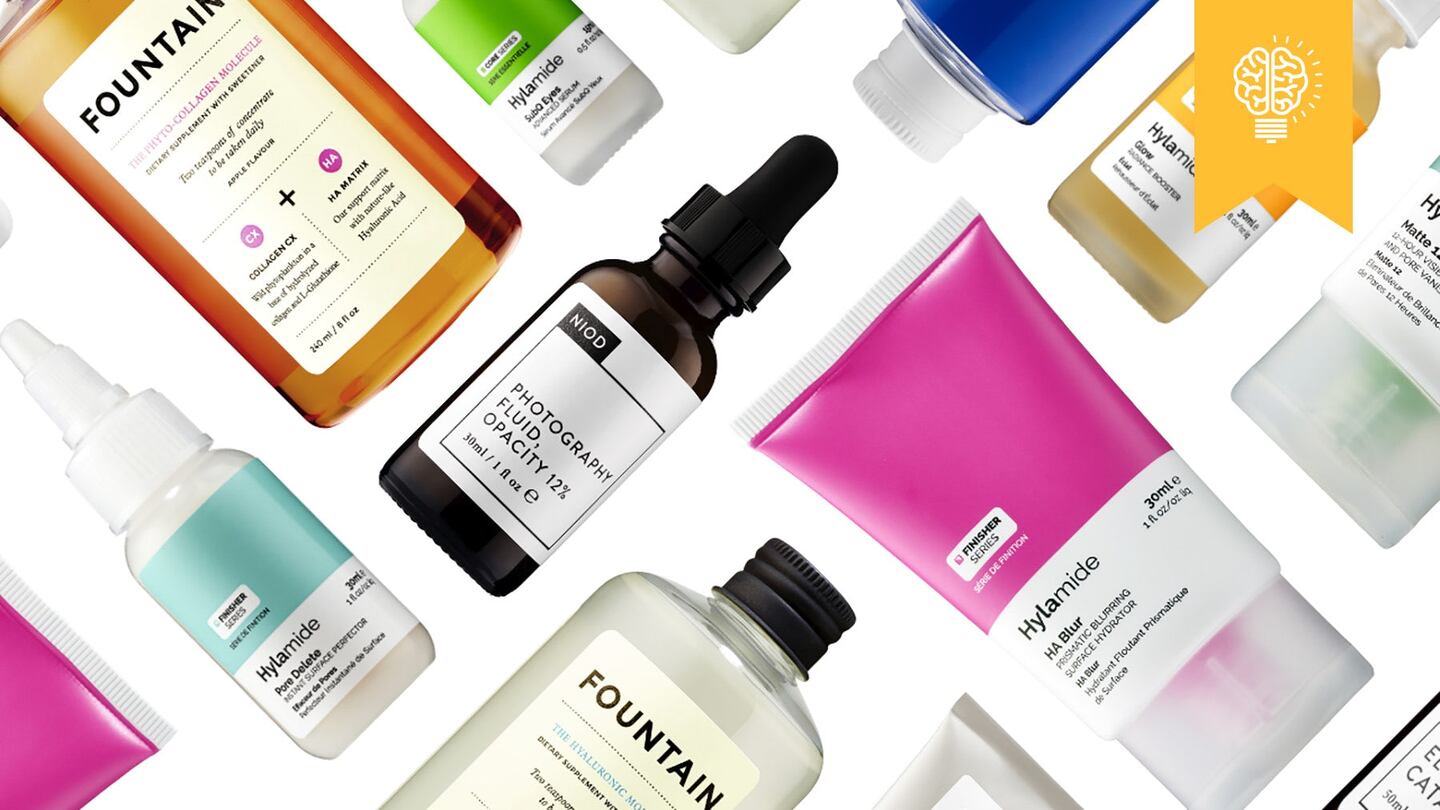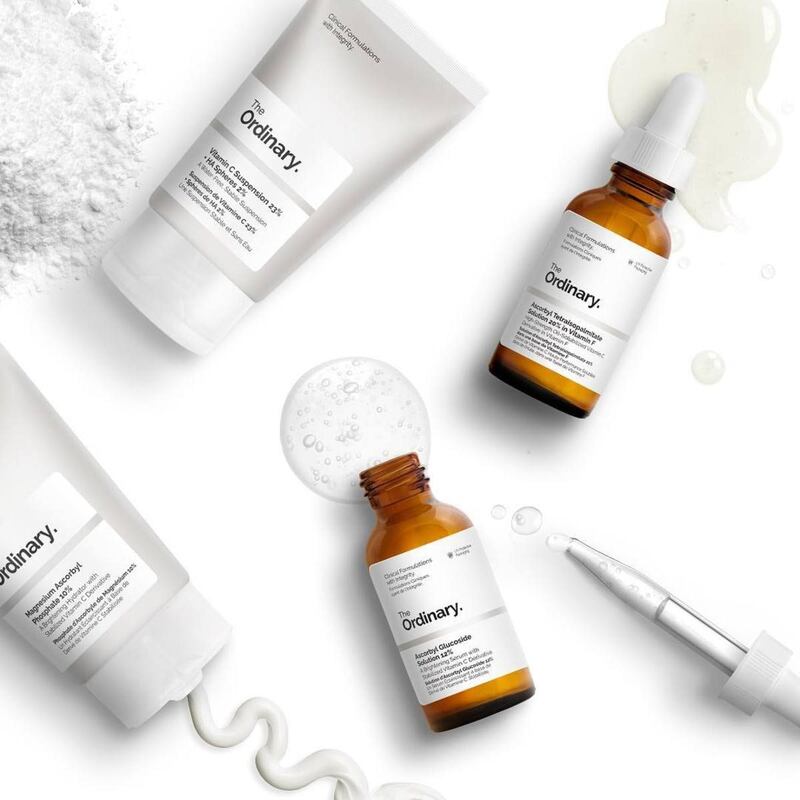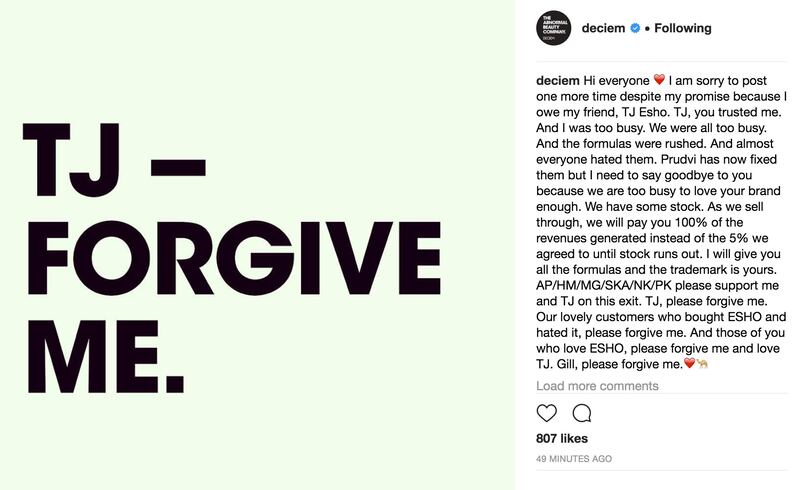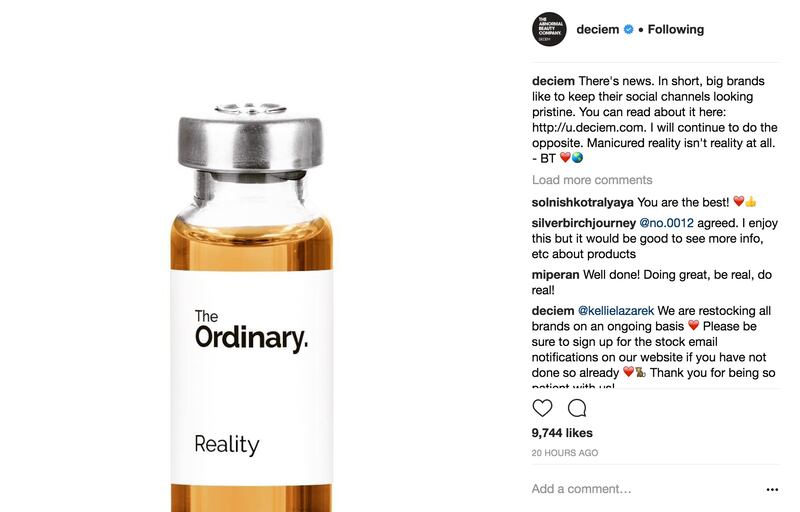
The Business of Fashion
Agenda-setting intelligence, analysis and advice for the global fashion community.

Agenda-setting intelligence, analysis and advice for the global fashion community.

NEW YORK, United States — Early last week, things at Deciem, the self-styled Abnormal Beauty Company, took a turn for the, well, abnormal. In a stream of increasingly erratic Instagram posts, it appeared, to some, that the famously eccentric, brilliant and much admired founder, Brandon Truaxe, had gone off the deep end — or was, at the very least, treading dangerously near it.
Since founding Deciem five years ago in 2013, Truaxe, a British-born Canadian, has been challenging the deeply rooted conventions of what it is to be a beauty company and how to run such a company in the modern, digital age. He has disrupted the industry with his honesty, his curiosity, his innovation and an unwavering refusal to conform to a set of accepted rules and paradigms that, when you think about it, do seem pretty dusty.
Truaxe created Deciem, derived from the Latin word decima (ten), as an umbrella for his burgeoning beauty empire. He set out to create ten ranges (because people were always telling him he couldn't do ten things at once) and has thus far created nine, though in the last week, that number abruptly shrunk to eight (more on that later.) His flurry of born-on-the-Internet brands started with liquid supplements (Fountain), hair care (Stemm) and hand care (The Chemistry Brand) to sidestep a temporary non-compete he had in facial skin care.
His biggest hits, though, have come precisely from products for the face. Niod — the nerd-chic, skintellectual’s delight, which stands for Non-Invasive Options in Dermal Science — applies what the company describes as an “iPhone approach” to skin care, regularly updating and re-releasing core products as newer, more advanced formulations become available.
ADVERTISEMENT
The Ordinary — which sold eight million units its first year in business — takes an opposite tack, offering straightforward treatment products featuring tried-and-true ingredients (vitamin C, retinol, antioxidants), stylishly packaged at affordable prices. Consider a $6.80 hyaluronic acid serum, a $7.20 AHA/BHA peel or a bottle of cold-pressed, sustainably harvested virgin marula oil for $9.90.

Source: The Ordinary
After launching online with Sephora US this past December, the brand shot like a rocket to its number-one skin care spot (500-percent past forecast) and remains among the top-selling brands, according to the retailer. In 2017, Deciem’s sales topped $100 million; this year the company expects sales in the neighbourhood of $250 million.
Where Truaxe really does things differently, though, is the way by which he communicates with his customers. Total transparency has been Deciem's calling card since the beginning and Truaxe, who has up until now managed the company's social account himself, has granted his audience — "monkeys" to the uninitiated — total access, engaging in back-and-forth dialogue about how to use his products and the science behind their ingredients, as well as sharing updates on the persistent inventory issues that continue to plague the brand. It is for this reason that Deciem took a minority investment, the amount of which was undisclosed, from the Estée Lauder Companies last June. These funds are enabling the company, previously funded by Truaxe personally, to build a new, much larger headquarters, a second factory and to get some outsourcing help, as demand has briskly outpaced production capabilities. (Estée Lauder had no comment for this story.)
Truaxe takes feedback, criticism and requests from his community to heart, and as a result of his agile, unfettered style of doing business, puts new initiatives into practice with nearly instantaneous effect, often firing off orders to his executive team members via spontaneous Instagram posts.
This unusually direct way of doing business has won legions of devoted followers, and not just to Deciem’s products. Truaxe is mesmerising in person, and even more so online, where he stares intently into the camera lens, speaking candidly, and often emotionally, about family, love, charity, peace, the environment, and, of course, beauty products. He is magnetic, mysterious, modest, thoughtful. Guru-like.
And whereas Truaxe — whose bio on Deciem’s website is punctuated by the all-caps headline “THE FOUNDER IS SCREWED UP!” — has established a company celebrated for rewriting the rulebook (Rule #1: there is no rulebook), in the last few weeks, via the very public platform of Instagram, it all appeared to skid slightly off the rails.
Things kicked off on Wednesday, January 24, when Truaxe confided in a video that he could not sleep the previous night, thinking about “the beautiful comments and emotions” his followers had been sharing and was henceforth cancelling all further marketing plans: “From now on, I’m going to communicate personally with you and share my thoughts with you.”
ADVERTISEMENT
In this new age of radical transparency, what do you share and what remains behind closed doors?
On January 28, he mended fences with Drunk Elephant founder Tiffany Masterson, apologising for a “distasteful” critique of her (competing, more expensive) marula oil and promising to donate $25,000 to an elephant-based charity.
Three days later, on January 31, in an on-the-fly video shot on the street, he disclosed he was shuttering the hair care range, Stemm, because “it’s not working. It was too expensive; we rushed through it,” he explained, before directing Mira Singh, director of consumer engagement, to “put it on sale at 70 percent off, starting tomorrow.”
The next day, on February 1, while travelling in a car, Truaxe announced he was dropping his chief executive title in favour of Worker. “I’ve never been a CEO and Deciem has never needed a CEO. Responsible people don’t need CEOs,” he explained. “I don’t want to be a boss. I want to be a friend.”
On Sunday, February 4, things spiralled: In what appeared to be the middle of the night, he posted that he could not sleep, again, because so many customers were worried that their favourite Stemm shampoo and conditioner would be discontinued — but not to fear, they would soon reappear under the banner of The Ordinary. Travelling through Morocco that day, Truaxe beamed out seven back-to-back posts documenting the environmental evils of plastic (including an oath to make Deciem as plastic-free as possible in the next year and publically letting one of his suppliers know that his services were no longer needed), followed by a snapshot of what appeared to be a dead sheep at his feet (reconfirming Deciem’s position against animal testing), and then a post introducing Riad, Deciem’s factory manager, to whom Truaxe revealed he had given a gift of $500,000 so his family could build a house. He ended the day by sharing a picture of traditional black soap, and his intention to go back and find the “gentle old man” who sold it to him in the medina in Fes.
Monday, February 5, sensing from critical comments that he had perhaps over-shared with his Insta-storm, Truaxe declared that he would build a separate team to manage the brand’s social content going forward. But, apparently, not quite yet. His coup de grace, a post illustrated with the all-caps plea “TJ — FORGIVE ME” hurtled out of the blue later that same day. It was directed at Harley Street doctor Tijion Esho, founder of Deciem-owned Esho, a range of lip treatment products. This was Truaxe’s way of letting Dr Esho know that the line bearing his name had been folded, just like that. “TJ, you trusted me,” wrote Truaxe, “And I was too busy. We were all too busy. And the formulas were rushed. And almost everyone hated them… I need to say goodbye to you because we were too busy to love your brand enough… TJ, please forgive me. Our lovely customers who bought Esho and hated it, please forgive me. And those of you who love Esho, please forgive me and love TJ.”
Streams of responses from Deciem’s 337,000 mostly confused enthusiasts ranged from the concerned (“R U OK HUN”) to the incredulous (“This guy is committing social suicide”), the mildly outraged (“This kind of thing should be done privately. It’s a real turnoff”) to the alienated (“I’m unfollowing… I just want to hear about the products.”)

Many were affronted by Truaxe’s admission that the products (which he was continuing to sell until they sold through) were rushed to market and apparently sub-par. Still, more objected to what they perceived as a disconcerting lack of professionalism — the airing of delicate internal issues on a public platform, and the treatment of Dr Esho, who learned for the first time that his company was folded along with everyone else in the world. “Brandon, what are you doing? Others at the company should pls pls stop this man from making these posts [sic],” pleaded one follower. “I’m hoping this is temporary and these personal issues find the appropriate forum. This is not it… I’m genuinely concerned for the welfare of the person posting here and I think he needs some support,” commented another.
It was also a reminder that even though Truaxe now styles himself modestly as Worker, he is most certainly still the boss. There is, indeed, a hierarchy, and as he displayed by closing down an entire company with the flick of the wrist, the buck stops with him. “Brandon wanted the decision to be final; he didn’t want discussions and delays,” offered Nicola Kilner, Deciem’s co-CEO, who I sat down with the following afternoon, in the midst of the online firestorm. “Even though it probably wasn’t the normal way to handle that kind of decision, his reasoning is, he didn’t want it to drag out and become a more painful experience for everyone,” she said. “The plate was too full and things were falling off. It was us saying, where can we put our efforts to sustain the business?”
ADVERTISEMENT
By avoiding a conversation — if not in-person, by telephone or even personal email would have been easy enough, one presumes — and making an impossible-to-retract public declaration, he closed himself off not only to discussion, but also to dissension. That’s not very friend-like and actually not so CEO-like, either. It also struck many as cowardly. And though, as stated in his post, he generously granted Dr Esho all future revenue, plus the company’s other assets and IP, what are they worth now that Truaxe publically torpedoed the brand, elaborating (and to what end?) about how much people “hated” it?
The real question Deciem’s recent Insta-mania raises is, in this new age of radical transparency — an era Truaxe helped to usher in — is there a line, and if so, where is it? What do you share and what remains behind closed doors? Were Truaxe’s actions — full of raw emotion and driven by impulse, it seemed, rather than strategy — reckless and naïve, or just upfront?
“We’ve always been transparent, but maybe this was different, as it was being transparent on a personal level and from the heart, as opposed to the past where it was just about products and stores,” explained Kilner. “We listen to feedback, and honestly we lost some followers over the last two days, but Brandon’s thing is he’d rather be a brand with a soul, a person with a soul,” she continued, raising in my mind the question of where the founder ends and the brand begins, and if Truaxe personally draws a distinction.
The consequence is a legion of empowered customers who feel entitled to decide what about your business is also their business.
Part of the reason his unfiltered, impromptu style may feel so unnerving — and refreshing — is that we’ve become so used to manufactured messages, remarked one beauty industry executive who, like me, watched with wonder as Truaxe’s social media chronicles unfolded in real time. True transparency would seem to entail pulling back the curtain, opening all of the windows and doors and inviting the world inside, but last week’s events also beg the question: How much does the actual consumer really want to know? “Man, I love The Ordinary and striving for transparency is admirable, but this is getting really messy,” lamented one commenter.
Some, though, want to know everything — and as a result of the precedent Truaxe has set, a great many of his “monkeys” not only wish to have an all-access pass, they expect it. By declaring virtually nothing out of bounds, Truaxe struck a chord and opened the floodgates.
The uncomfortable consequence, though, is being confronted by a legion of empowered customers who feel entitled to decide what about your business is their business. And it extends far beyond requesting specific product formulations, clamouring over delivery dates or crying foul when new products (like The Ordinary’s forthcoming Watercolour foundations) are not launched when originally promised.
As revealed in the ongoing Glassdoor saga — in which Deciem has received a not-insignificant number of negative, and in some cases troubling, reviews from former employees about workplace practices — when these empowered brand loyalists feel they have not been given a satisfactory explanation, they do not relent. When commenters continued to ask, this past week, for a more detailed Glassdoor defense, the usually forthcoming Truaxe turned off the tap. “I’m sorry that I won’t acknowledge,” he responded coolly. “We have never treated any employee poorly and I will never accept any of the exaggerated claims on Glassdoor.” Some took his refusal to play ball as a dodgy blanket dismissal. In their defense, he’s the one who opened the door.
From the obsessed to the concerned, the frustrated to the furious, one thing is clear: If, in a jam-packed marketplace where authenticity is king and engagement is the new stick the industry uses to measure success, Deciem, with its throngs of deeply invested followers, is surely winning. “People would give anything to have that kind of fan base,” sighed the beauty executive.
“There is something to be said for more transparency and less polished communications from companies,” says Anthony Johndrow, chief executive of Reputation Economy Advisors. “Authentic means not perfect and sometimes not fully baked — which means some of it will upset some people and that's OK. At the same time, I believe the new desire for corporate authenticity is balanced with the old one for reliability. When a company reaches a certain size, it needs to find its way to mature transparency in its communications. There has to be a happy medium between corporate opacity and unfiltered rants.”
On Tuesday, February 6, the day after the infamous TJ post, in Deciem’s version of getting back to business as usual (even though at Deciem, there is no such thing as business as usual, noted Kilner), the company posted an innocuous monkey illustration, accompanied by an update on The Ordinary’s promised sunscreen. Some took the bait and waxed rhapsodic about SPF; others expressed concern for the mercurial founder (“Dude we really hope you’re doing okay!”) and felt his absence (“I miss the B who came to our FB group for 20 plus hours to answer every single question! Come back to us monkey!”). Many rejoiced that peace had been restored once more to their kingdom (“Yasss you guys are functioning normally again!”). “Really psyched that Brandon is no longer running this account. Just saying,” remarked one follower, to which Truaxe responded, in a comment that you’d have to be heartless to not feel sad reading, “Sorry it’s still Brandon. It has always been. But I’ll focus the content solely on products as you have requested until we can find a social creative team.”

The next day, Wednesday, February 7, the most transparent company in the beauty world thought better of the capricious TJ post and did something not so transparent: They deleted it without saying a word. They also edited out a number of nasty comments and vulgar, cruel barbs traded between commenters, which were disturbing simply in how uncharacteristic they were of the supportive, tightly knit community Deciem had built.
A few days later on Saturday, February 10, several videos had been uploaded to Instagram of users burning the brand's products. A defiant, and, it seemed, wounded, Truaxe shot back one more time via video, laying down the new rules of engagement. He acknowledged that his audience had not enjoyed his “open posts” or the Esho post, which he in turn deleted. “But despite my respect for you, you continue to be disrespectful on this account, so… now I’m going to start changing things,” he said. “I founded Deciem, so the social account is actually my property… And I’ve welcomed you, but if you’re going to abuse it, I’m going to ask you to leave… From now on, we’re going to be deleting any negative comments unless it’s constructive and useful criticism. And I’m going to go back and gently post things I believe in. Thank you and I love you, the ones who love me and us. I love you.”
By Monday, Truaxe, clearly still rattled by what he described as “the unjust distraction that’s not letting me focus on anything well,” ensured his loyalists that “everything is OK. Please don’t worry.” He followed this later in the day with a clever shot of a faux bottle of The Ordinary serum named Reality. The caption: “Big brands like to keep their social channels looking pristine. I will continue to do the opposite. Manicured reality isn’t reality at all.”
Related Articles:
Landing a retail partnership is often seen as a major milestone for beauty founders — but it brings a bevy of new challenges, from the logistical complexities to setting a marketing budget. Black entrepreneurs, who typically have far less capital to work with, often face tough choices.
The firm has been working on a listing since at least 2022, with previous attempts buffeted by volatile markets.
In a three-part series, The Business of Beauty explores how Black founders Monique Rodriguez, Danessa Myricks and more built, launched and scaled their multi-million-dollar businesses. In part one, a look at how these entrepreneurs found their niche and harnessed early lessons that were critical to their growth
There’s something both innocent and concerning about 13-year-olds’ obsession with skincare. Kids will always want to find new ways to express themselves, but the beauty industry has a responsibility to protect its youngest customers.